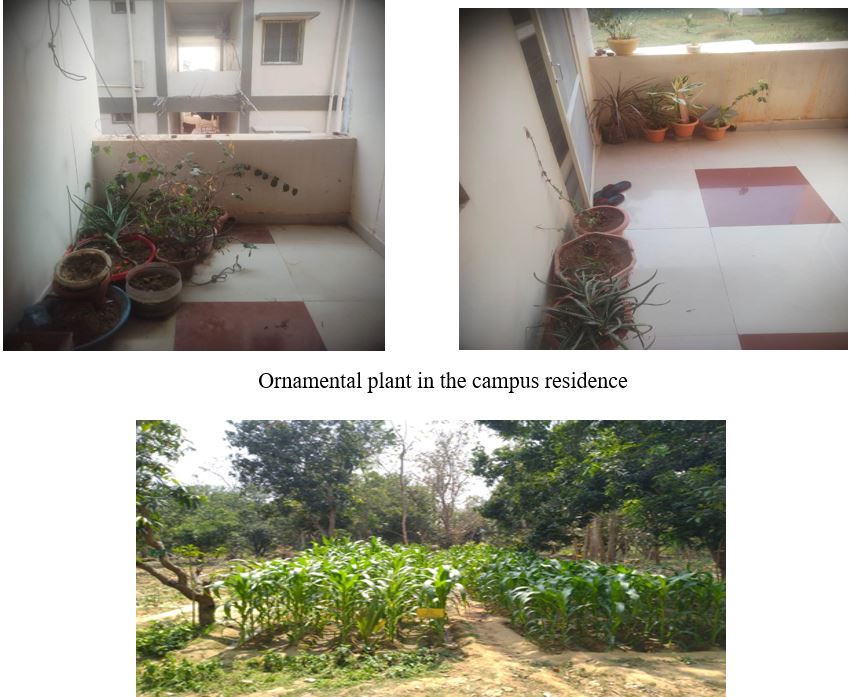Educational programmes/outreach for local or national communities
Centurion University is deeply committed to offering educational programs and conducting outreach initiatives for both local and national communities with a strong focus on the sustainable management of land for agriculture and tourism. Additionally, the University places a strong emphasis on agricultural heritage and organic farming, hydroponics, smart agriculture, hi-tech horticulture, fodder cultivation, lemon grass cultivation, vanilla cultivation, bee culture, and lac culture to obtain a sustainable environment.
Training and workshop for external students (smart agriculture):
The University has effectively equipped students with essential knowledge and skills for sustainable cultivation through various training programs. From April 2 to 8, 2024, 31 postgraduate students participated in a comprehensive program focused on sustainable agricultural practices, including biodiversity enhancement and water conservation, with hands-on experiences in plantation setup and sustainable irrigation. Earlier, 16 students from the College of Horticulture in Chaibasa received similar training on cultivation techniques and economic aspects of dragon fruit farming from 9 to 15 January 2024. Additionally, from May 20 to 27, 2024, six students from Sri Sri University engaged in a tailored program emphasizing the integration of dragon fruit into agroforestry systems and its socio-economic benefits. These initiatives collectively foster the development of future agricultural leaders committed to sustainable land management and ecosystem conservation.


Courses particularly focusing on wild flora and fauna, are crucial components of many Bachelors of Science in Agriculture (B.Sc. Ag) programs. Apart from this the domains and new emerging areas like Phyto Pharma, Renewable Energy, Intensive Aquaculture, Fish Processing Technology, Genetics and Genomics, Smart Agriculture, Animal Cell Culture, Seed Technology, Tissue Culture, Food Processing, Organic Farming, Horticulture, Dairy Processing, Composite Design and Manufacturing, Waste to Wealth aim to educate local and national communities about the importance of biodiversity conservation, sustainable use of natural resources, and ecosystem management.
| SI No. | Course Name | Course Credit |
| 1. | Farming System and Organic farming for Sustainable Agriculture | ASAG3207 |
| 2. | Fruit and plantation crop cultivation | ASHO 2102 |
| 3. | Manures, Fertilizers and Soil Fertility Management | ASAC2202 |
| 4. | Production Technology for Ornamental Crops, MAPs and Landscaping | ASHO2204 |
| 5. | Introductory Agro-meteorology and climate change | ASAG1202 |
| 6. | Agricultural marketing and prices | ASEC2103 |
| 7. | Principles of Integrated Pest and Disease Management | ASAP3204 |
| 8. | Environmental studies and disaster management | ASES3101 |
| 9. | Rural Sociology & Educational Psychology | ASEE1101 |
| 10. | Post-harvest Management and Value Addition of Fruits and Vegetables | ASHO3205 |
| 11. | Weed management | ASAG2105 |
Link of courseware: http://courseware.cutm.ac.in/
Courses Focused on Community Education
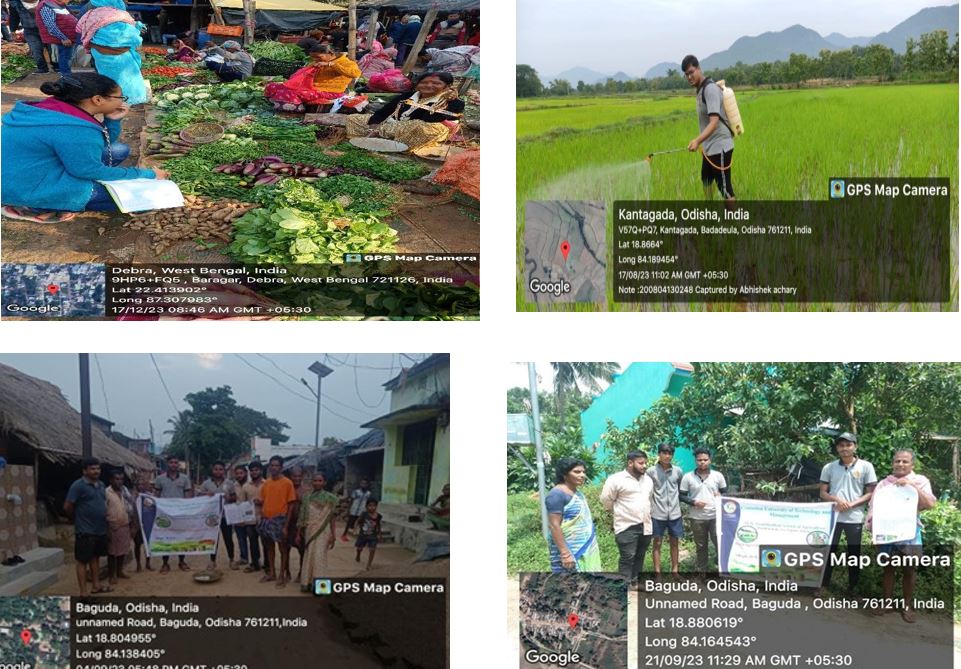

Genetics and Genomics into educational curriculum:
These programs can empower individuals and organizations to actively participate in sustainable development initiatives aimed at preserving terrestrial ecosystems and biodiversity for future generations.
The Summer Internship 2023 (May 15 – June 7) and Summer Internship 2024 (May 20 – June 12) provided participants with a dynamic learning environment focused on molecular biology and bioinformatics. Spanning various areas such as plant screening against biotic stress, genomic DNA/RNA isolation, PCR techniques, gene cloning, and plant tissue culture, the internships offered both hands-on experience and
theoretical insights. Participants engaged in practical sessions essential for understanding genetic diversity and biotic stress resistance mechanisms, while also exploring bioinformatics applications like transcriptomics and variant calling. Complementing this, a three-day hands-on workshop on Basic Techniques of Molecular Biology (November 23-25, 2023) provided foundational skills crucial for addressing Sustainable Development Goal 15 (SDG 15) – Life on Land.
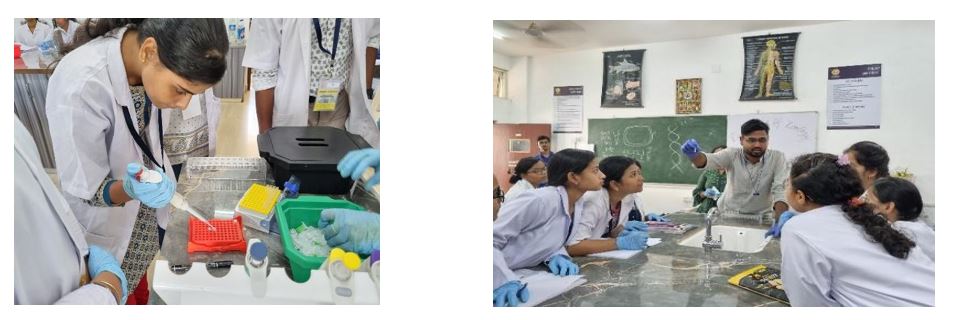
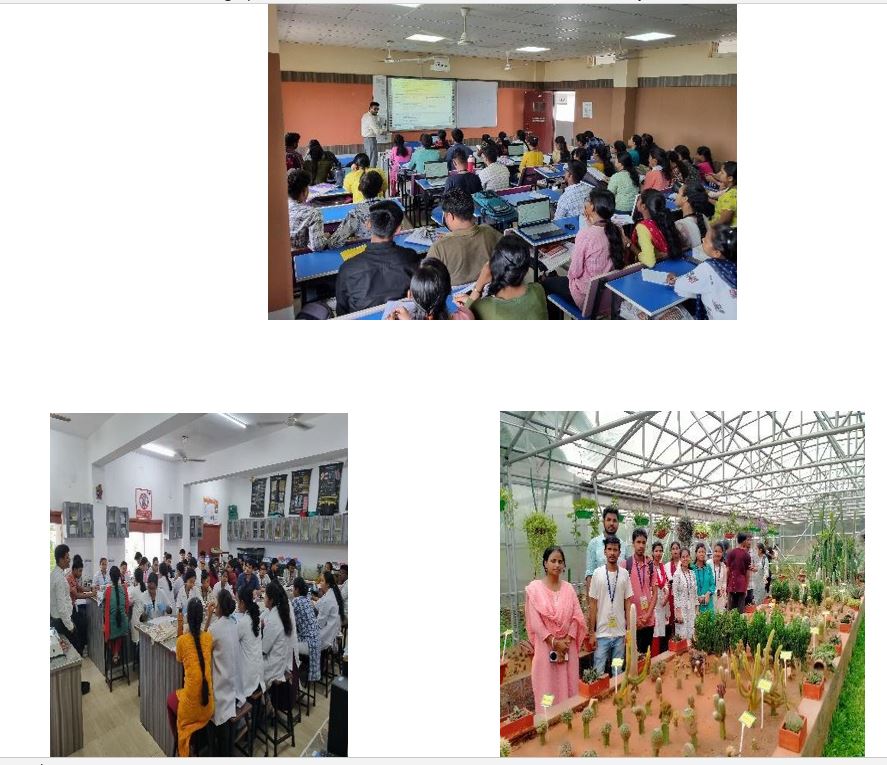
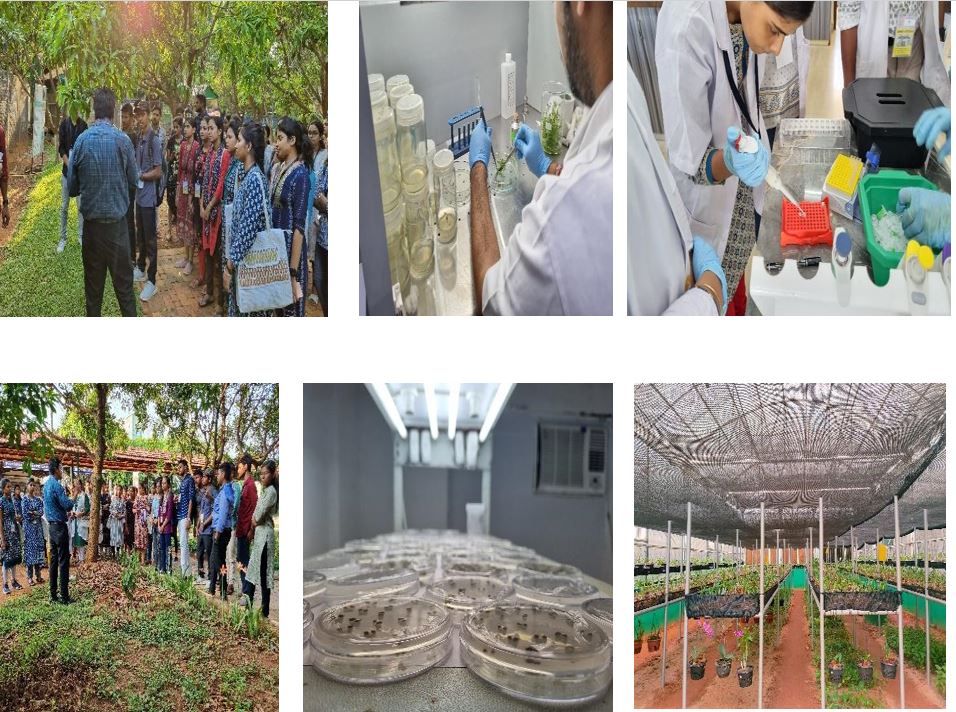
Organic farming unit:
Students from a Telangana minority residential school were participating in a month-long training program in March 2023, focused on organic farming cultivation. The training curriculum covers a wide range of topics essential for successful organic farming practices. Students learn about the importance of efficient farm management, including planning crop rotations, optimising resource utilisation, and implementing sustainable pest and weed management strategies. They also receive hands-on training in soil preparation techniques such as composting, mulching, and crop residue management, which are vital for maintaining soil fertility and structure in organic farming systems.
Collaborative training program with APICOL
A training program on 4th to 9th August 2023, was organised specifically for participants involved in APICOL with a focus on organic farm cultivation and horticultural crops. This specialised training aimed to equip beekeepers and agricultural enthusiasts with the knowledge and skills necessary to integrate beekeeping practices with organic farming and horticulture, thereby enhancing crop productivity, biodiversity, and sustainability. 21 Participants received comprehensive instruction on various aspects of organic farm management, emphasising soil health, nutrient management, pest and disease control, and sustainable agricultural practices conducive to supporting pollinator populations, particularly bees.
Mushroom unit:
The educational programs in mushroom cultivation are instrumental in promoting sustainable agriculture, improving nutrition, creating livelihood opportunities, and empowering communities. By imparting knowledge and skills, these programs empower individuals to harness the potential of mushrooms for economic, nutritional, and environmental benefits, contributing to a more resilient and sustainable future. Some events are listed below.
M. S. Swaminathan School of Agriculture, Centurion University, Paralakhemundi in collaboration with International Crops Research Institute for the Semi-arid Tropics (ICRISAT), Hyderabad organised a Capacity Building Training Programme on Mushroom and Spawn Production for the master trainers in December 2023 at Centurion University of Technology and Management, Paralakhemundi campus, Odisha, India. 8 master trainers along with their research technicians and scientific officers completed the training programme. The farmers were from 4 different districts of South Odisha i.e., Nabarangpur, Koraput, Rayagada, and Gajapati. Programme was started with the initial formal interaction cum interview of locally elected persons. After selection candidates were sent to the concerned units for hands-on training. B.Sc.Hons. (Ag.) students of AELP demonstrated the steps, and types of equipment/ raw materials required for spawn and mushroom production. They collaborated with the master trainers and trained them with hands-on training.
Odisha Livelihood Missions (OLM) project on “Sustainable improvement of rural livelihoods and restoration of coconut-based livelihoods through specific science-based interventions” jointly organised by ICRISAT, Hyderabad and CUTM, Paralakhemundi, Odisha for SHG farmers in Sept 2023 at Centurion University of Technology and Management, Paralakhemundi, Odisha.
Hands on training to students and SHG farmers
In the hands on training programme the number. of Students participated are 13 and no. of SHG Farmers participated are 24 (Including Coordinators) from the district Nabarangpur, Koraput, Rayagada, and Gajapati, Odisha. The Training Materials Provided are in both English and Odia training manuals, leaflets on mushroom and spawn production technology, training schedule, notepads, pens which includes Field visits to commercial agricultural enterprises.
Hands-on training sessions at Spawn Unit, Mushroom Unit, and Microbiology Lab for 4th-year B.Sc. Hons. (Ag.) students from AELP program, ICRISAT scientific officers, District coordinators where they will be trained for Mushroom and Spawn Production, Economic outputs. Under this training program, master trainers were given one challenging task: to produce at least 500 bottles of spawn and 200 bags of oyster mushroom bed preparation. Satisfactorily they have crossed the target by producing 588 bottles of spawn and 250 bags of Oyster mushroom beds within two days.
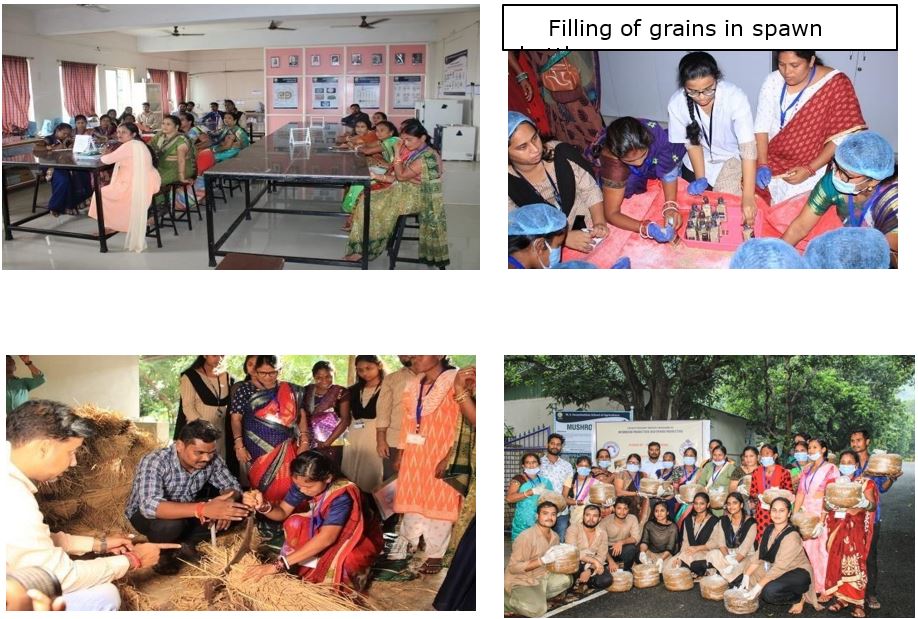

Vanilla Project
The Vanilla project was initiated in July 2024 in M.S. Swamianthan School of Agriculture, Centurion University, Paralakhemundi with association of the Australian Vanilla Plantation Group, Sydney shown in figure 8. The project includes growing vanilla under different environments to evaluate its adaptability and performance. In Hi-tech cultivation, the vanilla plants are grown under a rotary ecological trellis system to regulate their vertical growth and equal light distribution to each vine including feeding to aerial roots with organic nutrients. The dome structure provides a well controlled microclimate for vanilla plants. Under low cost polyhouse, the plants are subjected to controlled light and rainfall. The plants are also planted under natural conditions providing support with mango plants to evaluate their performance.
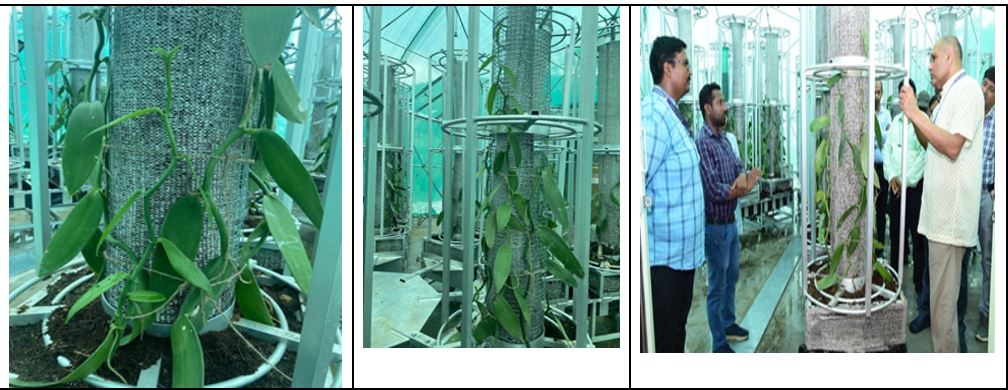

Herbal garden
The Herbal garden consists of 35 herbal species and 55 medicinal tree species was established in M.S. Swamianthan School of Agriculture, Centurion University, Paralakhemundi shown in figure 9. The garden has become a well-established demonstration center for students, farmers and other institutes. The garden has been labeled with a QR code system of nomenclature which provides complete details of the plant about its medicinal value, plant botany and its growing practices. Medicinal plants propagated and supplied to different institutes and Govt. office to set Herbal garden in their premises. As of now, we have sold out 30 species of medicinal plants and revenue about 10, 000 rupees.
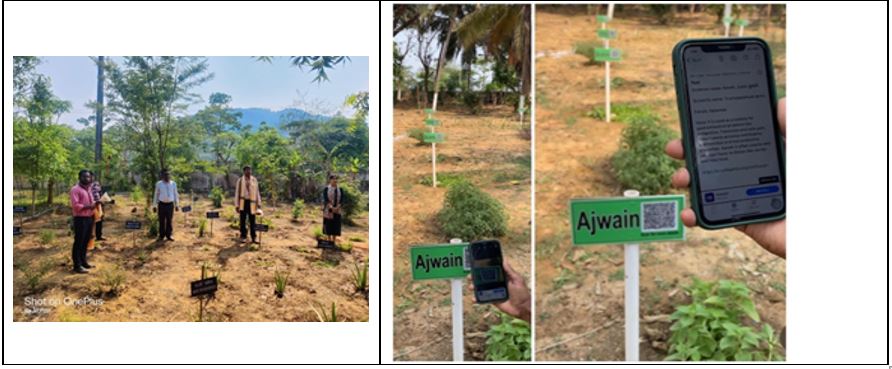
Orichadarium
Recently, the Orchidarium has been established in M.S. Swamianthan School of Agriculture, Centurion University, Paralakhemundi comprising 5 species of orchid collected from different regions of Odisha, Andhra Pradesh and Siliguri. The unit consists of 550 numbers of plants with an objective to grow, acclimatize, propagate and distribute plantlets to farmers and entrepreneurs of orchid in the region.

Commercial Horticulture Nursery
The Commercial Horticulture Nursery situated at M.S. Swamianthan School of Agriculture, Centurion University, Paralakhemundi over 2 acres having more than 200 plant species of ornamental, fruits, plantation, medicinal and vegetable seedlings. It has a well equipped polyhouse and shade net house which has the capacity of producing 10,000 plantlets in a month. The nursery has an average revenue record of 5000 rupees worth plants monthly. Maximum plants are consumed in the different campuses of the University.
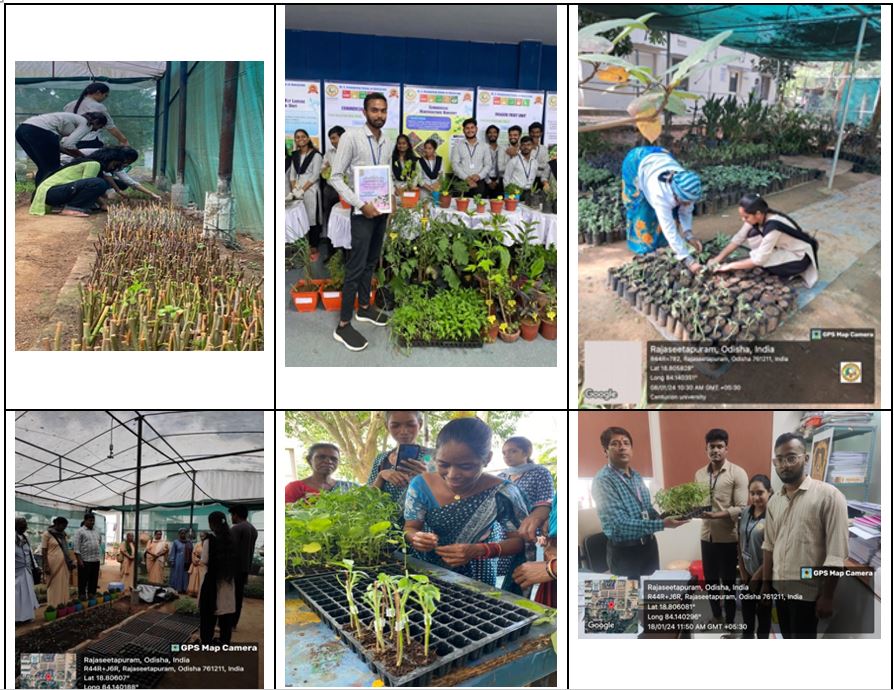
One Plant One Person: A unique initiative of ARBORICULTURE
The One Plant One Person: A unique initiative of the ARBORICULTURE programme has been initiated in M.S. Swamianthan School of Agriculture, Centurion University, Paralakhemundi. The initiative has been designed to ensure that each student will be responsible for nurturing their assigned sapling throughout their four-year academic journey. This program not only contributes positively to the environment by enhancing air quality and green cover but also instills a sense of responsibility towards community among the students.
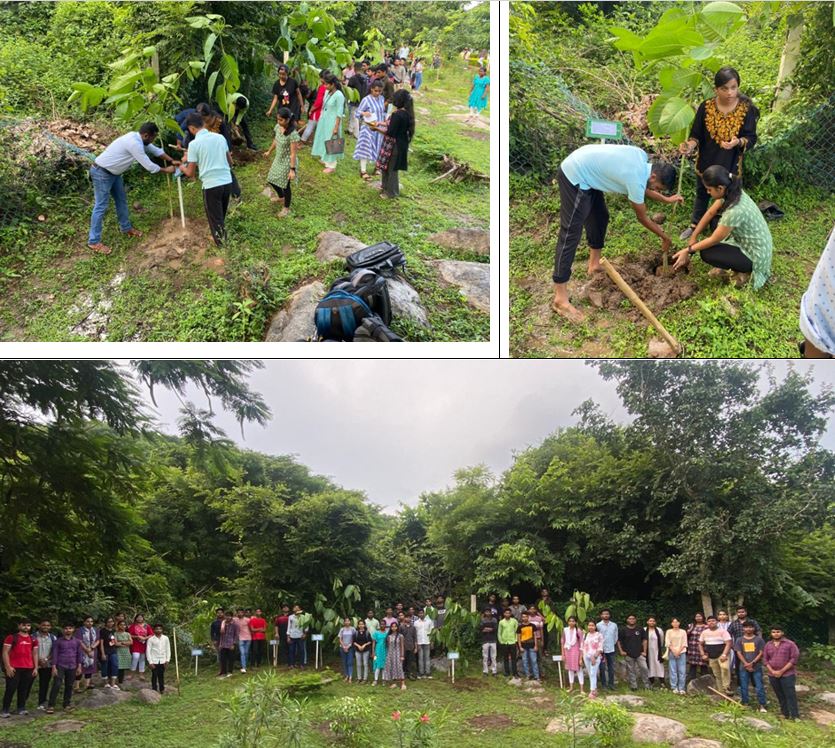
Urban Agriculture at Centurion University Campus
At the campus, urban agriculture initiatives are actively providing a variety of fresh produce, including vegetables, saag (greens), flowerning, ornamental plants. The initiative emphasizes efficient space utilization on campus, enabling residents to grow crops in small areas such as walls and balconies. By supporting diverse crop production, it promotes biodiversity and provides access to nutritious food. Engaging students and staff in gardening activities fosters community spirit and encourages sustainable practices. Additionally, these projects offer practical learning experiences, teaching students about sustainable agriculture, food systems, and environmental stewardship.
